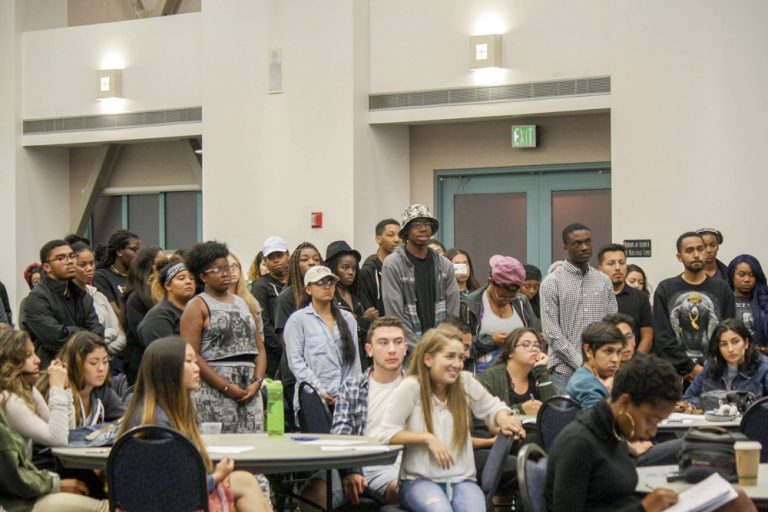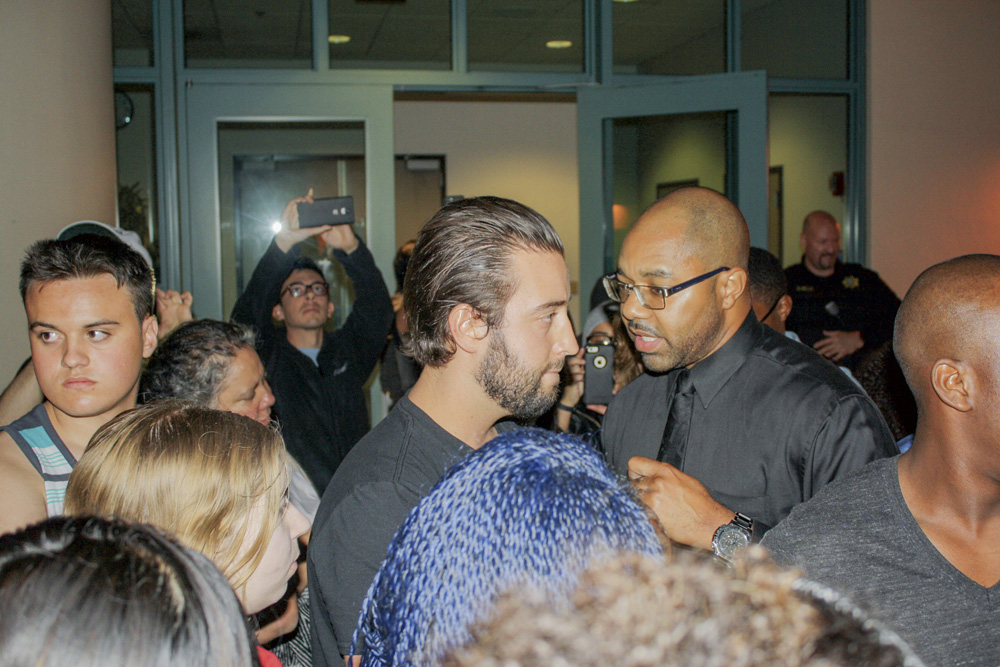
Madeleine Lee
Campus Beat Reporter
After a “Senate BLACKout” demonstration drew over 70 students of color and their allies to Corwin Pavilion, Associated Student Senators voted Wednesday to fund a College Republicans event featuring conservative political commentator Ben Shapiro.
The decision, cast in a secret ballot at the end of the six-hour meeting, culminated in a 16-5-2 vote, with 16 in favor and 5 opposed.
In a meeting Monday, the A.S. Finance and Business Committee approved a request from College Republicans to allocate $5,000 in student fees for Shapiro’s honorarium. In order for organizations to receive funding granted by F&B, the senate must approve their minutes from the meeting.
Controversy surrounding the decision began Wednesday when students of color and their allies gathered in Corwin Pavilion with a letter to A.S. Senators outlining their concerns with the Shapiro event.
The letter, sent to The Bottom Line, points to Shapiro’s record of “espousing transphobic, homophobic, and anti-black language.”
“Hidden behind the guise of ‘creat[ing] awareness and bringing truth to serious issues in our community,’ this event is a poorly masked attempt, using the defense of free speech, to antagonize Black students and further a highly disputatious agenda,” read fourth year math and black studies double major Danielle Patterson, who took turns reading the letter to senators with two other students Wednesday night.
The letter included approximately 150 signatures from individuals and groups across campus and the larger Isla Vista Community, including the Black Student Union, members of the Student Commission on Racial Equality, and People of Isla Vista.
BSU Director of Education Chair Monaé Orange and dozens more lined up for public forum, expressing grievances of safety, identity, and marginalization to senators directly.
“This is not a game for us, this is our lives, this is our physical and mental safety,” said Orange during public forum. “We are here to represent ourselves as students on this campus. This event taking place affects our safety and our comfortability here.”
Andrew Gates, president of the UCSB College Republicans, was joined by several affiliates touting American flags and Donald Trump hats at the podium to defend their stance.
“My issue with them is that they need to shut down an event simply because they disagree with it,” said Gates in regards to his detractors. “We aren’t paying thousands of dollars in tuition to shelter ourselves in safe spaces.”
Tensions escalated steadily throughout the night, as College of Creative Studies Senator Jordan Mitchell stepped down from the senate table and engaged in a verbal argument with Gates, who refused to stop filming the meeting despite IVP Jordan’s protests.
Several minutes after Mitchell left, at the conclusion of public forum, a second verbal altercation broke out in front of Corwin Pavilion between Shapiro’s supporters and detractors.
“I would just say that people are taking the opportunity to unleash some deep-seated frustrations,” said Dean of Student Life Katya Armistead, who kept students at bay on the sidelines while A.S. Assistant Director for Government Affairs LaDonte King and four UCPD officers worked to break up the crowd. “It’s just unfortunate that we couldn’t have done this in a more productive way but people are upset and this is what happens when you get involved in highly emotional situations.”

Hours after the crowd had dispersed, senators, with the help of A.S. Attorney General Gefen Laredo, finally began discussion.
In his weekly report to senate, Laredo pointed to several crucial lines of policy iterated in A.S. Legal Code to aid senators in their decision, citing the Bill of Rights, By-Laws, and Policies and Procedures of the Finance and Business Committee in order of precedence.
Though Laredo reminded senators that the Bill of Rights holds the most binding precedent over subsequent bodies of law, he also highlighted a significant “grey area” that exists between two of its articles: Article II.D.i, which enumerates the right of all students to have a “safe space,” and Article II.G, which enumerates the right of all students to be “free from discrimination and harassment” on the basis of a list of factors that included both race and political belief.
“One side feels harassed by race, one side feels harassed because of their political beliefs,” said Laredo in reference to students of color and UCSB College Republicans. “Both of these are enumerated in this clause, which makes it difficult to decide which is right and which is wrong.”
To fill the policy void, Laredo pointed to more explicit rhetoric enumerated in 86.31 of The Finance and Business Committees Policies and Procedures Addendum.
“Such sponsored events supported in whole or in part by compulsory campus-based student fees need not avoid controversial political, religious, or ideological content, subject to the understanding that under current University policy […] campuses have a responsibility to assure an ongoing opportunity for the expression of a variety of viewpoints,” the policy states, referring to Section 30.20 of the Policy on Speech and Advocacy.
A.S. Internal Vice President Natalie Jordan recommended that senators keep a political “viewpoint-neutral” approach when voting. After reviewing policies, senators changed the dialogue, which had been overwhelmingly ideological during public forum, to one based in A.S. Legal Code policy, despite many voicing their personal displeasure at Shapiro’s rhetoric.
“I think that no matter how disgusting or righteous or whatever we think the content is, it is our job as senators to follow legal code,” said Off-Campus Senator Ashley Selki.
However, even after the final vote was cast, senators continued to express their grievances.
“I don’t think we’re really respecting this whole ‘safe space’ thing,” said On-Campus Senator Lesly Silva, who argued that senators ignored the precedent established in the Bill of Rights clause. “This is so important to so many students that they drafted a letter signed by hundreds and came here today to ask for our support. We were called today to help historically underrepresented groups and we failed them.”
Senators did agree to combat the content of the talk to the best of their abilities by planning alternative safe spaces the night of the event. Though they don’t yet have a set date, UCSB College Republicans is hoping to host Shapiro on campus in early December.
“I’m glad that they didn’t cower in the face of these aggravators,” said second year UCSB College Republicans member Emily Williams in response to the senate’s decision.
Student Advocate General Josephine Ampaw, who spoke at the meeting on Wednesday, responded for comment in a statement issued to The Bottom Line.
“Students of every race, gender, sexuality, age, ability, and every other identity should never feel silenced based off of their beliefs,” Ampaw wrote. “The work that they do every day plays an important role in the success and rich history of this institution.”
Activists against the Shapiro event declined to comment to The Bottom Line at the time of Wednesday’s meeting.
















